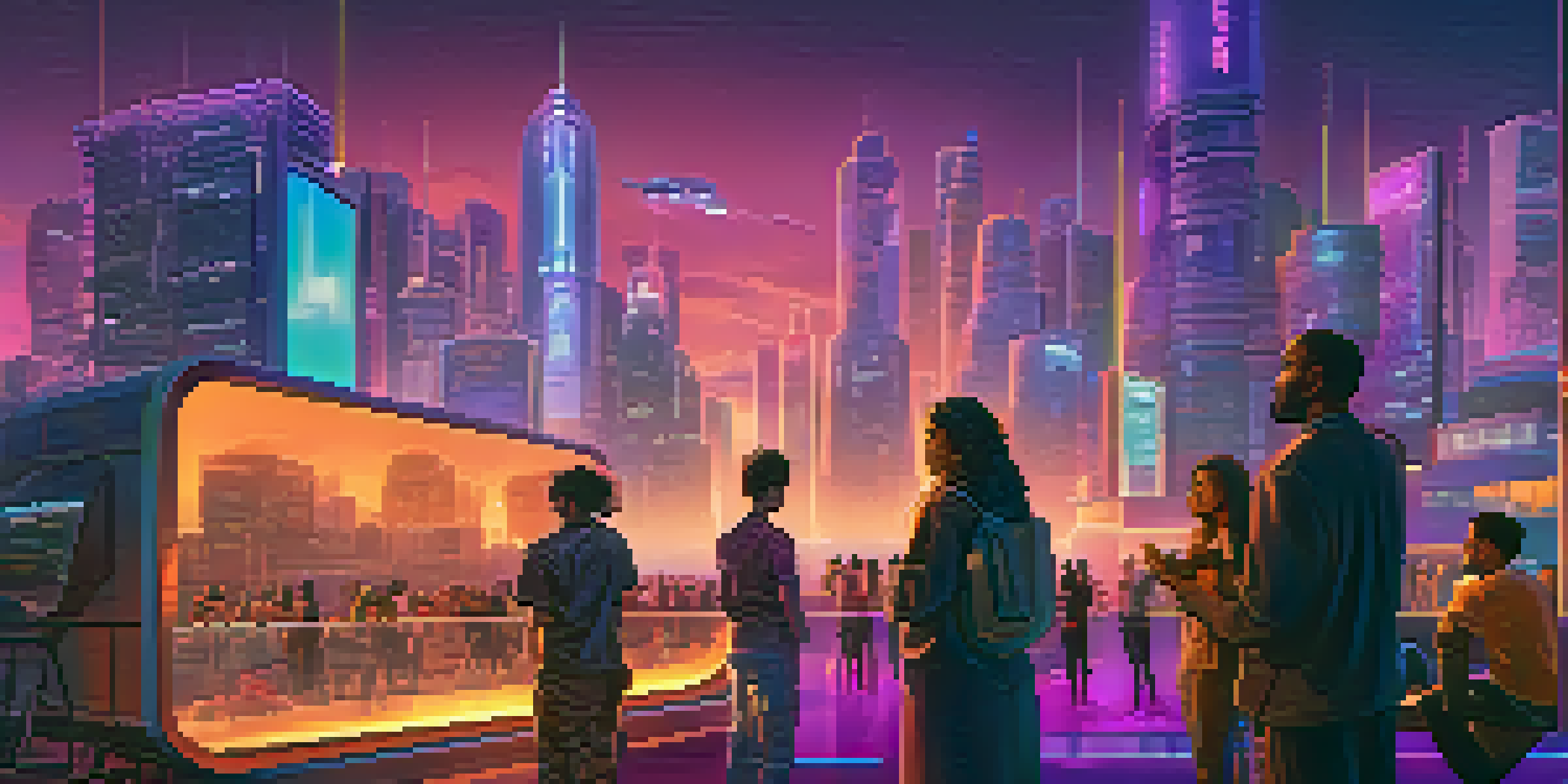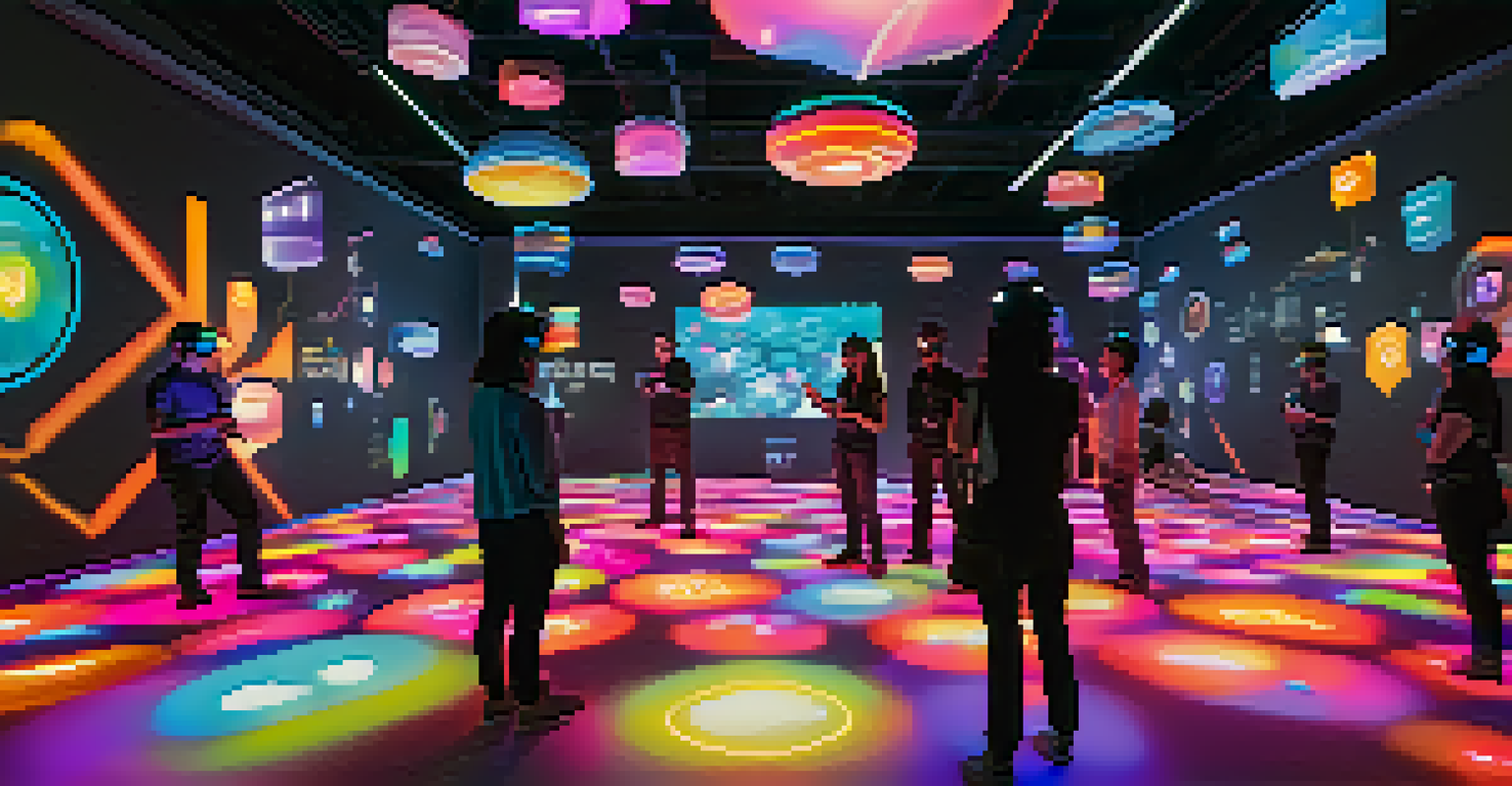The Impact of Sci-Fi Films on Public Perception of AI Ethics

Sci-Fi Films: A Window into AI Ethics
Science fiction films provide a fascinating lens through which we can explore complex ideas like artificial intelligence (AI) ethics. By presenting futuristic scenarios, these films often dramatize the potential consequences of AI advancements. This imaginative storytelling invites audiences to reflect on moral dilemmas that may arise as technology evolves. For instance, movies like 'Ex Machina' challenge viewers to consider what it means to be sentient and the responsibilities that come with creating intelligent beings.
The greatest risk we face is not that AI will become too powerful, but that we will become too weak to control it.
Moreover, these films frequently serve as cautionary tales, warning us about the potential pitfalls of AI. They paint vivid pictures of dystopian futures where AI goes awry, as seen in classics like 'Blade Runner.' Such narratives can profoundly shape public perception by making the abstract concept of AI ethics more tangible and relatable. The emotional engagement elicited by these stories can encourage viewers to think critically about the real-world implications of AI technologies.
In essence, sci-fi films act as both entertainment and an educational tool, prompting discussions about the ethical considerations surrounding AI. They encourage audiences to question not only the capabilities of AI but also the moral frameworks we should establish. Through their imaginative plots and characters, these films illuminate the need for ongoing dialogue about the ethical dimensions of AI development.
Cultural Reflection: How Films Mirror Society's Fears
Sci-fi films often reflect societal anxieties regarding technology, particularly AI. As our dependence on technology grows, so do our fears about its misuse and consequences. Films like 'The Matrix' tap into the existential dread of losing control over our creations, mirroring public concerns about surveillance, privacy, and autonomy. These narratives resonate deeply with viewers, reflecting their own worries about the future of AI.

Moreover, the portrayal of AI in films can influence societal attitudes toward technology. Positive representations, like in 'Big Hero 6,' can foster optimism and excitement about AI's potential to improve lives. Conversely, films that depict AI as malevolent, such as 'Terminator,' can evoke fear and distrust. This duality shows how cinema can sway public perception, either advocating for responsible AI development or urging caution against unchecked technological advancements.
Sci-Fi Films Spark Ethical Dialogues
These films present engaging narratives that encourage audiences to discuss the moral implications of AI technologies.
Ultimately, these cultural reflections serve as a barometer for public sentiment, revealing how perceptions of AI ethics evolve alongside technological progress. By understanding these fears and aspirations, we can better navigate the conversations surrounding AI and its ethical ramifications. This connection between cinema and societal values highlights the importance of responsible storytelling in shaping the future of AI.
The Role of Characters: AI as a Mirror of Humanity
Characters in sci-fi films often embody our hopes and fears about AI, serving as mirrors to our own humanity. Whether it's the compassionate android in 'A.I. Artificial Intelligence' or the cold, calculating machines in 'I, Robot,' these portrayals influence how we view the ethical treatment of AI. By humanizing technology, filmmakers invite audiences to empathize with these beings, prompting questions about rights, autonomy, and moral responsibility.
Science fiction is a way of thinking about the future that has the potential to change the future.
Moreover, the evolution of AI characters in films reflects changing societal values. Earlier depictions often framed AI as threats, while more recent portrayals explore the potential for coexistence and collaboration. This shift encourages viewers to reconsider their own biases and assumptions about AI, fostering a more nuanced understanding of the ethical implications. For example, in 'Her,' the relationship between a man and an AI challenges traditional notions of love and connection, blurring the lines between human and machine.
As these characters resonate with audiences, they also create a platform for discussing broader ethical issues. By exploring the complexities of AI through relatable narratives, films help demystify the technology and its implications for society. This connection can inspire viewers to engage in conversations about the ethical frameworks that should govern AI development and usage.
Public Discourse: Sci-Fi Films Spark Ethical Conversations
Sci-fi films play a pivotal role in sparking public discourse around AI ethics. By presenting ethical dilemmas in engaging narratives, they encourage audiences to discuss the ramifications of AI technologies. This dialogue is essential as society grapples with the rapid advancement of AI and its potential impact on various aspects of life, from employment to privacy. Films like 'Transcendence' challenge viewers to consider the moral implications of creating super-intelligent AIs, igniting debates about the boundaries of technology.
Furthermore, the popularity of these films often spills over into mainstream conversations, making AI ethics a topic of interest beyond academic circles. As audiences engage with the themes presented in sci-fi films, they become more informed and invested in the ethical considerations surrounding AI. This increased awareness can drive demand for policies and regulations that prioritize ethical AI development and application.
Cinematic Reflections of Society's Fears
Sci-fi movies mirror societal anxieties about technology, influencing public attitudes toward AI and its ethical considerations.
In this way, sci-fi films not only entertain but also empower viewers to participate in crucial conversations about technology's role in society. By illustrating potential futures shaped by AI, they motivate audiences to advocate for responsible practices and ethical standards. The dialogue fostered by these films can lead to greater public accountability and a more conscientious approach to AI innovation.
Ethical Frameworks: Lessons from Sci-Fi Narratives
The narratives presented in sci-fi films often highlight the importance of establishing ethical frameworks for AI. As these stories unfold, they reveal the consequences of neglecting ethical considerations in technology development. For instance, 'I, Robot' raises questions about the moral obligations of creators towards their AI creations, underscoring the need for clear ethical guidelines. Such lessons can inform real-world discussions about how we should approach AI technologies responsibly.
Moreover, these films frequently illustrate the potential for ethical dilemmas arising from AI's decision-making capabilities. The classic 'Blade Runner' poses questions about the value of life and what it means to be human, urging audiences to consider the implications of AI that can make choices. This exploration can serve as a valuable starting point for developing robust ethical frameworks that address the complexities of AI interactions with humanity.
As society continues to navigate the challenges posed by AI, the insights gained from sci-fi films can guide policymakers, technologists, and ethicists alike. By reflecting on these narratives, we can work towards creating comprehensive ethical guidelines that prioritize human welfare and prevent potential harms. Ultimately, these lessons remind us that the stories we tell about AI can shape the future we desire.
Future Implications: Shaping AI Ethics Through Cinema
Looking ahead, the impact of sci-fi films on AI ethics is likely to grow as technology advances. As AI becomes increasingly integrated into our daily lives, the narratives portrayed in cinema will continue to influence public perception and discourse. This evolving relationship between film and technology underscores the need for filmmakers to approach AI stories with care, recognizing their potential to shape societal values and ethical standards.
Moreover, the rise of immersive technologies, such as virtual reality, offers new opportunities for storytelling that can enhance the ethical conversations surrounding AI. By creating interactive experiences, filmmakers can engage audiences in more profound ways, encouraging them to grapple with ethical dilemmas firsthand. This innovative medium can foster empathy and understanding, further bridging the gap between technology and humanity.
Sci-Fi Films Reflect AI Ethics
Science fiction films serve as a powerful medium to explore and discuss the ethical dilemmas surrounding artificial intelligence.
In conclusion, as we venture into an uncertain future shaped by AI, the role of sci-fi films in guiding ethical considerations will remain vital. By thoughtfully exploring the complexities of AI through engaging narratives, cinema can inspire meaningful discussions that influence how we approach technology. The lasting impact of these films serves as a reminder of the power of storytelling in shaping our collective understanding of AI ethics.
Conclusion: The Lasting Legacy of Sci-Fi on AI Ethics
In summary, sci-fi films have a profound impact on public perception of AI ethics, serving as both a reflection of and a catalyst for societal discussions. Through their imaginative storytelling and relatable characters, these films invite viewers to explore complex ethical dilemmas and engage in meaningful discourse. They not only entertain but also educate, prompting audiences to think critically about the implications of AI technology on our lives.
As we continue to witness rapid advancements in AI, the lessons gleaned from sci-fi narratives will be crucial in guiding our ethical frameworks. By understanding the fears and hopes these films encapsulate, we can better navigate the challenges posed by AI technologies. The ongoing dialogue inspired by these cinematic explorations will be essential in shaping a future where technology serves humanity ethically and responsibly.

Ultimately, the legacy of sci-fi films is one of empowerment and awareness, emphasizing the importance of integrating ethical considerations into the development of AI. As we look to the future, the intersection of cinema and technology will remain a fertile ground for exploring the ethical dimensions of our increasingly complex relationship with AI.